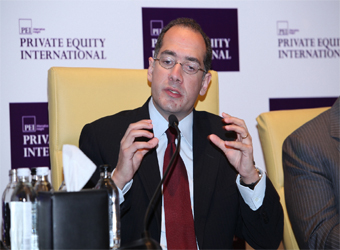In a keynote speech delivered at SuperReturn Middle East 2012, Citadel Capital (CCAP.CA) Co-Founder and Managing Director Hisham El-Khazindar told audiences on Monday that despite the economic and political fallout of the Arab Spring, finding opportunities during times of instability is still possible.
El-Khazindar presented Citadel Capital’s Egyptian Refining Company (ERC) as a case study of a project that is of strategic importance to Egypt and outlined how the firm managed to reach financial close on the US$ 3.7 billion refinery on the eve of Egypt’s first Presidential election.
‘Citadel Capital has a proven history of raising funds in challenging times, as we illustrated during the 2008-09 financial crisis and again this year,’ said El-Khazindar. ‘Despite adverse conditions, we have closed a US$ 3.7 billion package to construct a greenfield petroleum refining project in the Greater Cairo Area. This landmark investment led by Citadel Capital also includes top Egyptian, Gulf and international investors, global export credit agencies and development finance institutions who have contributed US$ 2.6 billion in debt and US$ 1.1 billion in equity.’
ERC is an outgrowth of one of Citadel Capital’s core investment themes: the necessity of energy deregulation. The project is an important component of Egypt’s energy security going forward: In addition to addressing an acute national shortage in refined petroleum products, ERC will also reduce present-day diesel import needs by 50%, improve air quality in the Greater Cairo Area by producing Euro-V diesel (the cleanest burning diesel fuel of its kind in the world, resulting in a nearly one-third reduction in the nation’s current sulfur dioxide emissions), help reduce Egypt’s annual subsidy bill, result in more than US$ 300 million in additional direct benefits to the state annually, and spur job creation.
‘The key to being able to raise funds for a large-scale infrastructure project of this magnitude under such challenging economic conditions was our ability to call on investors with mandates to invest in the economic growth of the region. This ability to access the ‘triple combination’ of development finance institutions (DFIs), export credit agencies (ECAs) from Europe, Asia and North America as well as sovereign wealth funds from the Gulf, is what made ERC possible,’ said El-Khazindar.
ERC is supported by US$ 1.1 billion in equity provided by a broad spectrum of investors including Egyptian General Petroleum Corporation (EGPC), which has invested US$ 270 million for a 23.8% interest), Qatar Petroleum International (QPI), which has committed over US$ 362 million for an effective 27.9% interest and Citadel Capital (which has directly and indirectly invested over US$ 155 million and holds an effective equity stake of 11.7%). Other participants include International Finance Corporation (IFC), Netherlands Finance Corporation (FMO), German Investment Corporation (DEG) and the InfraMed Fund.
ERC’s US$ 2.6 billion debt package includes US$ 2.35 billion of senior debt and US$ 225 million of subordinated debt. With the Bank of Tokyo-Mitsubishi serving as the global coordinator, institutions participating in the senior debt package include the Japan Bank for International Cooperation (JBIC), Nippon Export and Investment Insurance (NEXI), the Export-Import Bank of Korea (KEXIM), the European Investment Bank (EIB) and the African Development Bank (AfDB).
ERC stands as among the largest-ever project finance transactions in Africa and is one of Egypt’s largest inward investments. The project is expected to create over 700 permanent jobs in addition to 10,000 during the construction phase.
‘The key going forward is for large-scale investors to articulate the solutions they offer in a way that is clear to policymakers, to limited partners — including development finance institutions with high appetites for transactions that support the economic growth of the region post-Arab Spring— and to the citizens of the nations in which they do business,’ El-Khazindar said.
Investments such as ERC are also good for the overall image of long-term investors across the region because they further establish local sponsors as credible partners in important large-scale projects and are further evidence of the importance of growth capital in emerging markets such as Egypt.
Source: Press Release


